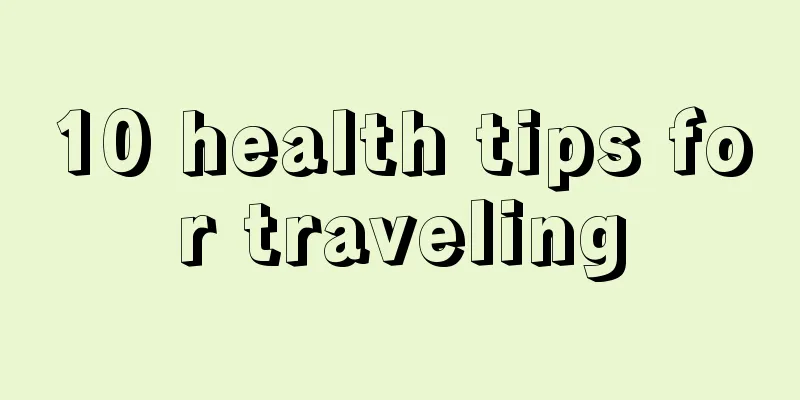10 health tips for traveling

|
1. Civility and courtesy are indispensable The traveling process basically takes place in areas that you are not familiar with, so you must not relax the basic requirements for yourself. When traveling, you must be polite to others at all times and in all occasions, be humble and tolerant in everything, consciously abide by public order, and avoid unnecessary conflicts that affect your travel mood throughout the journey. 2. Do not make loud noises or litter. Consciously maintaining tourist order, not making loud noises, not littering, not climbing at will, not scribbling, not smoking in non-smoking areas, not taking photos in prohibited places, etc., are essential qualities for a citizen when traveling, and are also the key content of the "civilized tourism" campaign. 3. Cultural relics and historical sites need to be protected This is a commonplace note to note. Wherever tourists go, they should consciously protect the cultural relics and historical sites, as well as the flowers, plants and trees in the scenic area, and not scribble on the scenic areas or historical sites. This is not only a reflection of your quality, but also a kind of care for natural and cultural resources, and it is also to preserve a beauty that can be passed on to our future generations. 4. Travel plans should be carefully planned. During the National Day holiday, especially for those who travel independently, you should have a full understanding of the travel destination in advance, make specific plans for the travel time, route, meals and accommodation, and bring a guide map, relevant maps, car and boat timetables and necessary travel items. Flexibly adjust travel plans according to the congestion situation of scenic spots! Friends who join tour groups should also pay attention that although most of your work travel agency has arranged everything for you, you still have some free time. How to make full use of this time to make your itinerary richer and your trip more enjoyable. 5. Carry a travel medicine kit with you When traveling, people with weaker physical fitness will definitely feel some discomfort because of the unfamiliar environment and the fatigue of traveling. There are also some unexpected situations that are inevitable when traveling, such as abrasions, sprains, etc. This requires friends to put some commonly used medicines in a small medicine bag in advance, in case of emergency. However, when encountering complicated situations, be sure not to take medicine casually and seek medical attention in time. 6. Be careful to prevent diseases when camping When traveling in autumn, some poisonous insects, snakes, hornets, etc. that pose a threat to the human body often hide in dense bushes and will attack people when they accidentally touch them. There are many ways to deal with poisonous insects in the wild. The most practical one is to find a wooden stick about one meter long for emergency use. Once you discover an animal such as a poisonous insect or snake, if you are not sure you can kill or drive it away, you must avoid it immediately. Don't yell. If you are attacked, squeeze out as much venom as possible from the wound and go to the hospital for treatment immediately. 7. Beware of "weather allergies" when traveling long distances in autumn As autumn approaches, some tourists choose to travel to scenic spots in the south with comfortable environments. However, tourists, especially the elderly, should pay attention to the possible "weather allergies" that may occur under different meteorological conditions. The first prevention method is to listen to the weather forecast before going out, and add or remove clothes according to weather changes to prevent sudden weather changes from triggering diseases. Second, the elderly should not travel to areas with extreme weather conditions, those with cardiovascular disease should not go to the Qinghai-Tibet Plateau, and those with more serious rheumatic diseases should not travel to the forest to prevent worsening of their condition. 8. Keep in mind the safety of your journey and try to travel with a companion When traveling, you may sometimes pass through some dangerous areas, such as steep slopes and dense forests, cliff paths, rapids and deep caves. In the past two years, there have been many accidents in scenic spots during travel. Therefore, in these dangerous areas, try to travel with companions, always keep safety precautions in mind, and never take the risk alone. 9. Things to note when traveling in autumn 1. It is not advisable to wear leather shoes, new shoes, high heels and sandals when climbing mountains. The shoes that are really suitable for mountaineering are lighter sports shoes, hiking shoes or waterproof shoes, and thick cotton socks to prevent blisters on your feet. 2. Mountain roads consume physical energy. When walking in the mountains, people are more likely to feel hungry and tired. Therefore, you should bring snacks with enough calories, such as chocolate, pancakes, eggs, etc. In addition, you should bring water, but not too much. I need too much, but it would be best if it is enough to quench my thirst but not a burden on my journey. 3. The temperature on the mountain varies greatly and the mountain wind is also strong, so you should bring enough clothes when going up the mountain. Autumn rain is unpredictable, so light rain gear is also essential. 4. Necessary trauma medicines, such as: Band-Aids, gentian violet, medicinal alcohol cotton balls, anti-inflammatory powder, etc. You can also prepare a towel, which can be used as a bandage when necessary. 10. Things to note when traveling with children in autumn 1. When choosing a tour itinerary, you should consider the interests and preferences of children while also taking into account the hobbies of adults and the arrangements for joint participation. Pay attention to choosing tourist spots that are interesting to children so that children will not feel bored. Make sure the itinerary is as relaxing as possible, avoid changing places every day, and don't let your child get too tired. 2. Make sure to bring enough supplies for your child or add more supplies during the trip. 3. Eat safely when taking children out for a trip. Eat in moderation and pay attention to food hygiene. Children should try to eat less food that they have never eaten before during the trip, and be sure to ensure the health and hygiene of the food to avoid allergies and gastrointestinal discomfort. |
>>: When is the best time to eat dinner?
Recommend
Brief analysis of common symptoms of extranodal lesions of lymphoma
Extranodal lesions of lymphoma are a common pheno...
What should I eat if I have mild fatty liver
No one wants to accept fatty liver, because once ...
Arthroscopic surgery
There are more and more joint diseases, and most ...
How to use corn patches correctly and how to prevent corns
Many people have experienced corns on their feet....
Can late-stage nasopharyngeal cancer be cured?
If you have nasopharyngeal cancer in the late sta...
What color is the nasal mucus caused by rhinitis
Rhinitis is probably the most troublesome disease...
Benefits of clean eating
There are great benefits to eating a clean diet. ...
How to prevent liver cancer? People with these characteristics are prone to liver cancer
Early symptoms are not obvious! A healthy liver o...
The efficacy and contraindications of quail eggs
Quail eggs can be used to replenish qi and blood....
Can Shenbao tablets treat impotence?
As the name suggests, Shenbao tablets are used to...
The benefits of drinking olives soaked in water
Olive is a fruit native to Fujian Province in my ...
What are the causes of skin cancer
What are the causes of skin cancer? Many people d...
How to treat tongue cancer in the middle stage
Many people are not aware of tongue cancer in lif...
If you can't handle the alcohol at work or social events, try these tips for hangover relief
Whether you are having a small gathering with fri...
What should I do if I don’t want to get pregnant after having sex?
Young people nowadays have more open-minded ideas...









